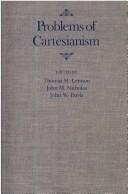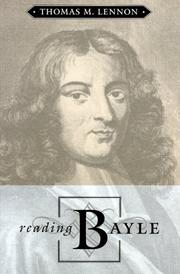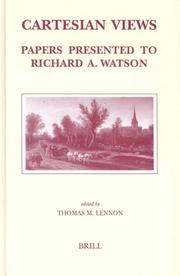| Listing 1 - 10 of 18 | << page >> |
Sort by
|

ISBN: 1282856391 9786612856396 0773563962 9780773563964 0773510001 9780773510005 Year: 1982 Publisher: Montreal McGill-Queen's university press
Abstract | Keywords | Export | Availability | Bookmark
 Loading...
Loading...Choose an application
- Reference Manager
- EndNote
- RefWorks (Direct export to RefWorks)
The typical Cartesian collection contains papers which treat the problems arising out of Descartes's philosophy as though they and it appeared for the first time in a recent journal. The approach of this collection is quite different. The eight contributo
Philosophie --- Science --- Philosophy, Modern. --- Sciences --- Modern philosophy --- Normal science --- Philosophy of science --- Philosophy. --- Philosophie. --- Descartes, René, --- Philosophy, Modern --- Philosophy --- Descartes, René --- Descartes, Renatus --- Cartesius, Renatus --- Descartes, Rene,

ISBN: 1282037323 9786612037320 1442679018 9781442679016 0802044883 0802082661 9780802044884 9780802082664 Year: 1999 Publisher: Toronto University of Toronto press
Abstract | Keywords | Export | Availability | Bookmark
 Loading...
Loading...Choose an application
- Reference Manager
- EndNote
- RefWorks (Direct export to RefWorks)
Pierre Bayle (1647-1706) is a key intellectual figure of the period, and his Historical and Critical Dictionary is the philosophy best seller of all time. This work is a critical but sympathetic treatment of a neglected thinker of interest in the fields of the history of modern philosophy, the history of ideas, and 17th century French culture.
PHILOSOPHY / Criticism. --- Bayle, Pierre, --- Bayle, Pierre --- Bayle, Peter, --- Beĭlʹ, Pʹer, --- Bayle, --- C. L. A. A. P. D. P.,
Book
ISBN: 1282400231 9786612400230 9047424468 9789047424468 9789004171152 9004171150 Year: 2008 Publisher: Leiden Brill
Abstract | Keywords | Export | Availability | Bookmark
 Loading...
Loading...Choose an application
- Reference Manager
- EndNote
- RefWorks (Direct export to RefWorks)
The skeptic Pierre-Daniel Huet’s Censura philosophiae cartesianae (1689) is the most comprehensive, unrelenting and devastating critique of Descartes ever. It incisively captures all the issues that now interest readers of Descartes: the method of doubt, the cogito , clarity and distinctness as criteria of truth, the circularity of the Meditations , proofs of God’s existence, et cetera Naturally, the work provoked great controversy among the Cartesians, who were implicated in various capacities—Nicolas Malebranche as the occasional cause of the publication, and Pierre-Sylvain Regis as the chief defender of the Cartesian camp. What emerges in this study of the controversy is a heroic, defensible Descartes. He possesses hitherto unappreciated answers to the criticisms that have bedeviled his philosophy from his time to ours.
Skeptizismus --- Skepticism. --- Scepticism --- Unbelief --- Agnosticism --- Belief and doubt --- Free thought --- Descartes, René --- Huet, Pierre Daniel --- Descartes, René, --- Descartes, Renatus --- Cartesius, Renatus --- Skepticism --- Descartes, René --- Huet, Daniel --- Huetius, Petrus Danielis --- Huet, Pierre-Daniel, --- Descartes, Rene,
Book
ISBN: 9789004400962 9789004404496 Year: 2019 Publisher: Leiden Brill
Abstract | Keywords | Export | Availability | Bookmark
 Loading...
Loading...Choose an application
- Reference Manager
- EndNote
- RefWorks (Direct export to RefWorks)
History of philosophy --- History of civilization --- anno 1600-1699 --- France
Book
ISBN: 9781400863396 1400863392 Year: 2014 Publisher: Princeton, NJ
Abstract | Keywords | Export | Availability | Bookmark
 Loading...
Loading...Choose an application
- Reference Manager
- EndNote
- RefWorks (Direct export to RefWorks)
By the mid-1600s, the commonsense, manifest picture of the world associated with Aristotle had been undermined by skeptical arguments on the one hand and by the rise of the New Science on the other. What would be the scientific image to succeed the Aristotelian model? Thomas Lennon argues here that the contest between the supporters of Descartes and the supporters of Gassendi to decide this issue was the most important philosophical debate of the latter half of the seventeenth century. Descartes and Gassendi inspired their followers with radically opposed perspectives on space, the objects in it, and how these objects are known. Lennon maintains that differing concepts on these matters implied significant moral and political differences: the Descartes/Gassendi conflict was typical of Plato's perennial battle of the gods (friends of forms) and giants (materialists), and the crux of that enduring philosophical struggle is the exercise of moral and political authority.Lennon demonstrates, in addition, that John Locke should be read as having taken up Gassendi's cause against Descartes. In Lennon's reinterpretation of the history of philosophy between the death dates of Gassendi and Malebranche, Locke's acknowledged opposition to Descartes on some issues is applied to the most important questions of Locke exegesis.Originally published in 1993.The Princeton Legacy Library uses the latest print-on-demand technology to again make available previously out-of-print books from the distinguished backlist of Princeton University Press. These editions preserve the original texts of these important books while presenting them in durable paperback and hardcover editions. The goal of the Princeton Legacy Library is to vastly increase access to the rich scholarly heritage found in the thousands of books published by Princeton University Press since its founding in 1905.
Book
Year: 1993 Publisher: Princeton University Press
Abstract | Keywords | Export | Availability | Bookmark
 Loading...
Loading...Choose an application
- Reference Manager
- EndNote
- RefWorks (Direct export to RefWorks)
Book
ISBN: 900440449X Year: 2019 Publisher: Leiden Boston : BRILL,
Abstract | Keywords | Export | Availability | Bookmark
 Loading...
Loading...Choose an application
- Reference Manager
- EndNote
- RefWorks (Direct export to RefWorks)
How much of our own self- interest should we be willing to sacrifice for love of another? The Quietists answered, all of it, even the salvation of our own soul. Opposing them were the Jansenists, including Arnauld, who saw self-interest as inescapable. The debate swept across French society in the 17th century, with Bossuet and Fénelon on opposite sides, and was multi- dimensional, with political and ecclesiastical intrigue, charges of heresy, and many shenanigans. Initially theological, the debate’s basis lay in differing philosophical concepts of freewill, with both sides claiming support from Descartes’s views. The debate thus highlights interpretation of the Cartesians, especially Malebranche, a prominent participant in it. Nevertheless, this is the first book on the debate in English.
Sacrifice. --- Self-interest. --- Quietism. --- Jansenists. --- Descartes, René,
Book
ISBN: 1281205559 9786611205553 140206893X 1402068921 9048177545 Year: 2008 Volume: v. 7 Publisher: [Dordrecht] : Springer,
Abstract | Keywords | Export | Availability | Bookmark
 Loading...
Loading...Choose an application
- Reference Manager
- EndNote
- RefWorks (Direct export to RefWorks)
How is it that the mind perceives the words of a verse as a verse and not just as a string of words? One answer to this question is that to do so the mind itself must already be unified as a simple thing without parts (and perhaps must therefore be immortal). Kant called this argument the Achilles, perhaps because of its apparent invincibility, and perhaps also because it has a fatal weak spot, or perhaps because it is the champion argument of rationalism. The argument and the problem it addresses have a long history, from the ancient world right up to the present. The Achilles of Rationalist Psychology consists of newly written papers addressing each of the main contributors to the discussion of the Achilles. Despite the historical importance and intrinsic interest of the argument, very little has been written about it. This volume should therefore be of use to advanced undergraduates, graduate students, and researchers across the domains of philosophy, history, and cognitive science.
Consciousness. --- Philosophy of mind. --- Rationalism. --- Mind, Philosophy of --- Mind, Theory of --- Theory of mind --- Philosophy --- Cognitive science --- Metaphysics --- Philosophical anthropology --- Knowledge, Theory of --- Religion --- Belief and doubt --- Deism --- Free thought --- Realism --- Apperception --- Mind and body --- Perception --- Psychology --- Spirit --- Self --- Philosophy (General). --- History. --- Philosophy of Mind. --- History of Philosophy. --- Philosophy, general. --- History of Science. --- Science, Humanities and Social Sciences, multidisciplinary. --- Psychology, general. --- Annals --- Auxiliary sciences of history --- Philosophy. --- Psychology. --- Behavioral sciences --- Mental philosophy --- Mind --- Science, Mental --- Human biology --- Soul --- Mental health --- Humanities --- Science --- Social sciences. --- Humanities. --- Humanities and Social Sciences. --- Behavioral Sciences and Psychology. --- Learning and scholarship --- Classical education --- Human sciences --- Sciences, Social --- Social science --- Social studies --- Civilization
Book
ISBN: 9781402068935 9781402068928 Year: 2008 Publisher: Dordrecht Springer
Abstract | Keywords | Export | Availability | Bookmark
 Loading...
Loading...Choose an application
- Reference Manager
- EndNote
- RefWorks (Direct export to RefWorks)
How is it that the mind perceives the words of a verse as a verse and not just as a string of words? One answer to this question is that to do so the mind itself must already be unified as a simple thing without parts (and perhaps must therefore be immortal). Kant called this argument the Achilles, perhaps because of its apparent invincibility, and perhaps also because it has a fatal weak spot, or perhaps because it is the champion argument of rationalism. The argument and the problem it addresses have a long history, from the ancient world right up to the present. The Achilles of Rationalist Psychology consists of newly written papers addressing each of the main contributors to the discussion of the Achilles. Despite the historical importance and intrinsic interest of the argument, very little has been written about it. This volume should therefore be of use to advanced undergraduates, graduate students, and researchers across the domains of philosophy, history, and cognitive science.
History of philosophy --- Pure sciences. Natural sciences (general) --- Science --- wetenschappen --- filosofie --- persoonlijkheidsleer --- geschiedenis --- psychologie --- wetenschapsgeschiedenis --- wetenschap --- Philosophy --- Psychology --- Achilles Tatius

ISBN: 9004132996 9786610465088 1423714172 1280465085 9047402650 9781423714170 9789047402657 9789004132993 9789004132993 9781280465086 6610465088 Year: 2003 Publisher: Leiden Boston Brill
Abstract | Keywords | Export | Availability | Bookmark
 Loading...
Loading...Choose an application
- Reference Manager
- EndNote
- RefWorks (Direct export to RefWorks)
Many kinds of Cartesian views are treated by these papers: the views that Descartes held, views from our perspective on those views, views on Descartes held by his early critics and followers, and views that are Cartesian in outlook (not for nothing is Descartes still regarded as the father of modern philosophy.) These overlapping views provide the unity of this volume, and reflect the unity of Richard A.Watson’s philosophical work. Not least among Watson’s contributions has been his depiction of Cartesianism as a response to a set of problems within Descartes’s philosophy. The later Cartesians were not slavish followers of Descartes. The contributors to this volume might be viewed as standing to Watson as the Cartesians did to Descartes. Contributors include: Jean-Robert Armogathe, Leslie Armour, Alan Gabbey, Daniel Garber, William H. Gass, Alan Hausman, David Hausman, Thomas M. Lennon, José R. Maia Neto, Steven Nadler, Richard H. Popkin, Han van Ruler, Theo Verbeek, Fred Wilson, and Alison Wylie.
Descartes, René, --- Descartes, Renatus --- Cartesius, Renatus --- Descartes, Rene,
| Listing 1 - 10 of 18 | << page >> |
Sort by
|

 Search
Search Feedback
Feedback About UniCat
About UniCat  Help
Help News
News